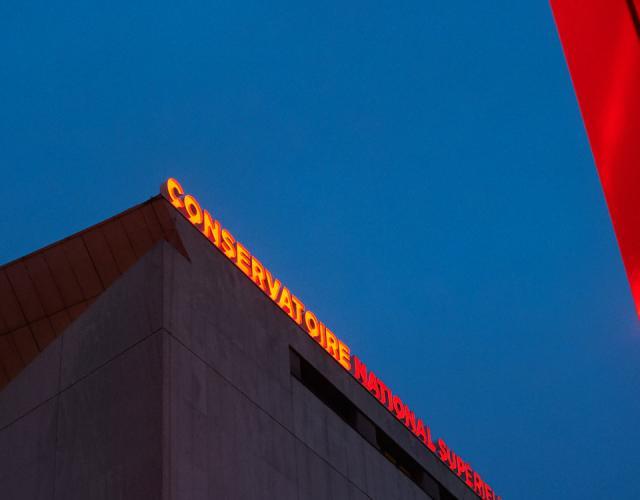
Higher education in Music, Sound and Image - Sound option - Cycle Supérieur
Information
-
Name
Higher education in Music, Sound and Image - Sound option
-
Cycle
Higher cycle
-
Course's number of years
2 years
-
Maximum duration
4 years
DURATION OF STUDIES - EUROPEAN CREDITS ECTS
The course lasts 4 years. It corresponds to the acquisition of 240 ECTS credits. The first two years of the programme are devoted to the acquisition of common knowledge, while the last two years are devoted to an individualised programme. The curriculum is organised around three areas of study:
- in-depth musical training ;
- technical and scientific training in the fields of recording production, creation, music and sound distribution and research;
- high-level practical training.
The curriculum is rounded out by a large number of work placements in the professional world. Students are required to attend all the courses on the FSMSI Sound curriculum. Depending on their availability, they may enrol in optional complementary disciplines. The average weekly number of hours of lessons and practical work during the course is close to 30.
-
Delivered diploma
Master's-level2nd cycle diploma in Music and Sound Engineering
-
Course objectives and content
OBJECTIVES AND CONTENT
Years 1 and 2
- Acquisition of universal knowledge, both musical and technical, specific to the profession of musician-sound engineer
- Development of artistic sensitivity and creativity
- Mastery of listening skills and sound analysis
The curriculum for these two years is based on five teaching units (musical teaching, scientific teaching, technical teaching, practical teaching and additional teaching).
3rd and4th years
The final two years are devoted to a more specific pathway, with the choice of a professional direction and specialisation (music production, live performance or creation). Under the guidance of personal tutors, students develop their independence and carry out numerous personal projects. Numerous specialisation courses are then organised.
In addition to work placements throughout the course, students will have the opportunity to work with the Conservatoire's audiovisual department during a compulsory two-month placement.
UNIVERSITY DEGREE
A partnership between the Conservatoire National Supérieur de Musique et de Danse de Paris and Sorbonne University enables students from the Conservatoire who so wish, and who have been admitted to a postgraduate course in sound engineering, to obtain a degree in Music and Musicology from Sorbonne-Université, in conjunction with the Conservatoire diploma and subject to fulfilling the conditions for enrolment at the university:
- Obtaining a diploma in music and sound engineering from the Paris Conservatoire.
- Validation at the University of two 26-hour courses, spread over two semesters, chosen from the "Musicological fields" teaching units.
Enrolment and payment of fees at the university are required in order to follow the courses.
Disciplines
Entrance exam
Higher Education in Music, Sound and Image - Post-graduate integration - SON specialisation
Opening date for registration : 12 January 2026
ENTRY COMPETITION 2026-2027:
No age limit for this competition
Application dates: from January 12 to April 13, 2026 online at www.conservatoiredeparis.fr.
The application must be completed online by 13 April 2026. The project must be submitted by midnight on 24 May 2026 at the latest on the Conservatoire's registration platform.
1) Applicants must meet the following prerequisites:
- BAC+3 diploma (European bachelor's degree or bachelor's degree from a scientific, technical or audiovisual training course) or international equivalent
- D.E.M level from a Conservatoire for music. Applicants must have a very good knowledge of music theory, a sound musical culture, a knowledge of composition (harmony and/or counterpoint) and musical analysis. (The pre-selection of applications by the jury will take place on 4 May 2026).
2) ELIGIBILITY
Selection by the jury of the candidates selected for admission on 1st June 2026
Review of each candidate's project portfolio, CV and covering letter
Candidates will be required to submit 3 personal musical, sound or audiovisual projects demonstrating a degree of originality or creativity, or simply showing a certain level of technical mastery.
The projects are free and may take any form: score, recorded music, model, sound recording, sound fiction, soundtrack for images, film music, sound design, video creation, audiovisual music clip, short film, video sequence of filmed music, etc.
The projects must be accompanied by an explanatory note detailing its implementation (artistic aims, choices, constraints, locations and tools used) as well as an assessment of the result obtained. Candidates should highlight what they themselves implemented and how. This note must be concise and may not under no circumstances exceed 3 pages.
3) ADMISSION
- Oral tests in musical training (16 June 2026) and sciences (17 June 2026)
- Critical listening test based on recordings OR comparative analysis test based on films, videos or extracts from the film repertoire (17 June 2026)
- Interviews in French with the jury (candidates will be asked to answer specific questions about their personal projects submitted with their application, as well as their professional experience) (18 and 19 June 2026).
N.B. : Candidates admitted to the competitive entrance examination for the2nd cycle who are not nationals of French-speaking countries must present, before 30 June preceding their first enrolment at the Conservatoire, a certificate issued by a body approved by the French government attesting to a level of French at least equal to B1 on the Council of Europe's scale of common reference levels, before 10 December following their first enrolment at the Conservatoire, a certificate issued by a body recognised by the French government attesting to a level of French at least equal to B2 on the Council of Europe's scale of common reference levels.
